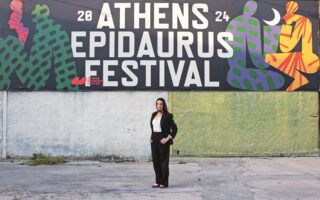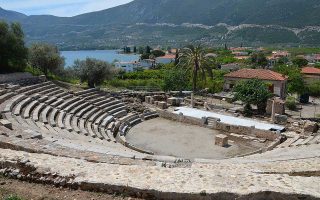‘The Song of the Earth’ on the edge of Greece

The Basilica of Agios Achillios, located on an island on the northern edge of Greece in Mikri Prespa Lake, is set to transform into a musical fairyland, echoing the sounds of Gustav Mahler.
The 10th-century historical landmark will host two consecutive immersive performances conducted by Yorgos Ziavras and directed by Sofia Paschou on August 24 and 25 as part of the Culture Ministry’s All of Greece One Culture program.
Kathimerini English Edition spoke to Paschou to understand the vision behind this unique project.
The song
Paschou, an actor and director in training, was brought on board by Ziavras to help bring this project to life. The performance features three key elements: Mahler’s “The Song of the Earth,” nature and the visitors. How does a director integrate these elements, and what is her role in this innovative presentation of classical music?
“I have previously directed musical pieces, and in such cases you need to step back because the focus is on the music, not on your own ideas. My role is to support and enhance the work, not overshadow it. The central element is ‘The Song of the Earth,’ and Yorgos and I developed a concept to turn it into a collective experience for the audience. It’s not just about listening to a piece or an orchestra but also seeing and experiencing. Ideally, we aim to activate all five senses. We are going to a place that feels like the middle of nowhere – almost like a timeless space, a starting point, or an end,” Paschou explains.
Mahler composed the powerful piece in the early 20th century during a period of personal tragedy, having lost his eldest daughter. He used Hans Bethge’s collection of rewritten classical Chinese poems for the text, which explores the Earth’s eternal beauty and human mortality.
Paschou describes the piece as evoking a range of vivid images and emotions, “some wild, some serene. When I listened to it again a few months ago, it felt like I was hearing and seeing the struggle of humanity with nature, the reconciliation and then the struggle again.”
Paschou and Ziavras will present this passionate piece against the serene backdrop of the island of Agios Achillios. “The contrast will be fascinating: a piece that creates such intense imagery performed in such a serene setting – a serene place that also harbors a lot of wildness,” she adds.
The place
‘It’s not just about listening to a piece or an orchestra but also seeing and experiencing. Ideally, we aim to activate all five senses’
Visitors arriving at Agios Achillios a couple of hours before sunset this August will be encouraged to explore the space during the first part of the performance. Musicians will be scattered around the island, each performing a different genre, from classical to traditional Greek music.
“At first, the audience will walk around the island, listening to pieces performed at different spots. We’ll allow visitors some space and time to explore the area,” Paschou says.
“There will also be a central figure, whom I see as representing Humanity with a capital H. This figure, who seems to have always been there, will help guide the audience to their seats as the main performance begins,” she adds.
Actor Panos Zygouros, referred to as “the Human” by Paschou, has played a key role as a co-creator throughout the process. On the day of the event, he will serve as a point of reference for visitors, encouraging them to move freely before gathering at the basilica at sunset for Mahler’s piece. Zygouros will also recite the poems featured in Mahler’s work, conveying the message of conflict and reconciliation between human mortality and eternal nature.
“It will be as if this figure is one of us but slightly ahead, guiding us with insights into what we are experiencing,” Paschou explains.
The performance will also feature tenor Andreas Karaoulis and baritone Georgios Iatrou. The musical ensemble includes violinists Katerina Chatzinikolau and Konstantinos Panagiotidis, violist Ilias Sdoukos, cellist Maria Skandali and double bassist Nikos Tsoukalas. The wind section consists of flutist Zacharias Tarpagkos, oboist Giannis Oikonomou, clarinetist Kostas Tzekos, and bassoonist Dimitris Dakovanos. Horn player Ioannis Gounaris, percussionists Panagiotis Ziavras and Stamatis Pasopoulos and keyboardists Alexandra Komninou and Giorgos Konstantinou complete the group.
The purpose
Why did these acclaimed musicians and artists choose to perform on the country’s edge?
“We live in a country where cultural activities are concentrated in Athens. For people to start attending performances elsewhere, it may take years.
This program serves as a wonderful bridge, gradually encouraging people to explore other venues,” Paschou says, referring to the All of Greece One Culture program, which has organized 70 performances this year alone at “venues” including archaeological sites, monuments and museums.
“There are many theaters in Athens, but there are also thousands of beautiful locations that can be transformed into performance spaces. Just considering that you can hear the orchestra not only at the opera house but also in these other places expands your perspective,” she adds.
Paschou acknowledges that Agios Achillios in Mikri Prespa Lake, which straddles the borders of Greece, Albania and North Macedonia, may be a long journey for Athenians.
However, this does not diminish the significance of the performance, whether for the local attendees or for the revitalization of the site itself.
“The beauty of this project is that it will take place on the island and become part of it. Anyone who comes will hear and feel it. It will seem as if it has always been there, as if these musicians have always been present, playing the same piece at every sunset,” Paschou concludes.





